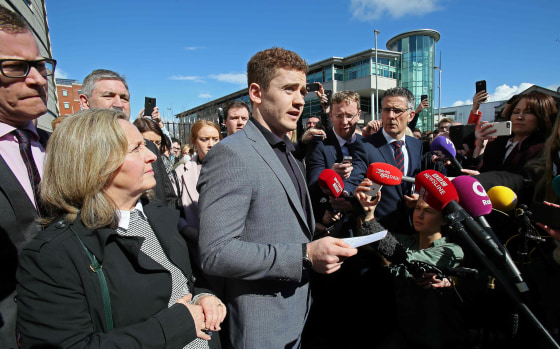It has been a long winter. On the second day of spring, it snowed in New York City and in Ireland, my native country, they are preparing for a frosty Easter.
Cold rain fell yesterday, as it often does there, on gathered crowds in cities across Ireland, holding aloft placards bearing the words “I Believe Her."
On March 27, after three hours and 45 minutes of deliberation, a jury in Belfast delivered a verdict in the trial that has captivated the whole island for the past eight weeks. Four men, two of whom were international rugby players, were found not guilty of charges of rape, indecent exposure and perverting the course of justice.
It was a particularly horrendous trial. The complainant spent eight days in the witness box; on one day her underwear was shown to the court and on another day she was asked by the defense counsel why she “didn’t scream the house down” if she was being raped. The evidence in the case included explicit text messages containing vile, misogynist language describing the incident, written by the defendants after the night of the alleged rape. From beginning to end, it was the stuff that nightmares are made of.
And it is so heartbreakingly, infuriatingly predictable.
It was a particularly horrendous trial. The complainant spent eight days in the witness box; on one day her underwear was shown to the court.
There is a widely held belief in Western society especially that judicial systems offer justice. We believe that if we have been wronged, things will be made right. This is a powerful, meaningful story. But of course it is not true.
When power meets privilege, bad things happen. And when powerful men realize how privileged they are, women are far too often the losers. This is especially true for powerful male athletes. In America, the National Football League has struggled for years with accusations of sexual and physical assault by its athletes, from Ray Rice to Greg Hardy to Josh Brown.
This isn’t exactly a surprise. As a society, we idolize and admire the elite in sports. In the UK the highest-profile stars tend to be in soccer, in Ireland it’s rugby. Almost every country has a beloved sport and its beloved set of stars. Indeed, for thousands of years, we’ve been told that strong, sporting men represent the best of our patriarchal species. Capable of strength and speed the rest of us mere mortals can only dream of, these are our modern-day gods, and we worship them.
When power meets privilege, bad things happen. And when powerful men realize how privileged they are, women are far too often the losers.
As a result, the belief that those who are rich, powerful and beautiful can have what they want and do what they want is not only tolerated within our culture, it is celebrated. Three days after Mike Tyson was convicted of rape, Donald Trump defended the boxer. Tyson served three years out of his six year sentence and went to on to enjoy a celebrated entertainment career doing cameos in “The Hangover” film franchise and TV show “Entourage.” Days before the 2017 NFL draft, Gareon Conley was accused of raping a woman in a hotel room a month earlier. A grand jury ruled not to charge him. Now he’s a cornerback for the Oakland Raiders.
Since October of last year, Americans especially have been experiencing a seismic shift in their perception of powerful men. The #MeToo movement has sparked a six month-long litany of abusers and predators. Meanwhile across the pond, there have been small ripples in the UK and Ireland, but nothing on the scale of what has happened in the U.S. (Libel laws may have something to do with this.)
Could this latest acquittal change that? In the days after the verdict was delivered in Belfast, rallies have been held in cities across the Republic and Northern Ireland. Another is planned this weekend. It’s possible that these sporting heroes have just awakened Ireland’s #MeToo.
Rape culture relies on silence. And it thrives upon the narrative of the lying woman.
Ultimately, rape culture relies on silence. And it thrives upon the narrative of the lying woman. When you throw celebrity and sports into the mix, women often don’t stand a chance.
From the NFL to boxing to swimming to soccer to rugby, male athletes are still abusing their power and using their privileged position to get away with it.
Hope, when there is some, comes in the arrival of a language for consent we didn’t have before. We are having conversations about power abuses and what they look like. We are seeing beyond the sparkle of sports stardom and taking stock of the wreckage it’s causing. There is a groundswell feeling of despair, yes, but if we’re naming the problem and talking, then we’re progressing.
Our winter is long, and it is tough. But if we keep believing her, perhaps spring will not be far behind.
Lisa Tierney-Keogh is an Irish playwright. She is a proud member of #WakingTheFeminists, a movement for gender parity in Irish theater. She is co-founder of Irish Stand, a grassroots movement supporting immigrants and vulnerable communities in the U.S.
